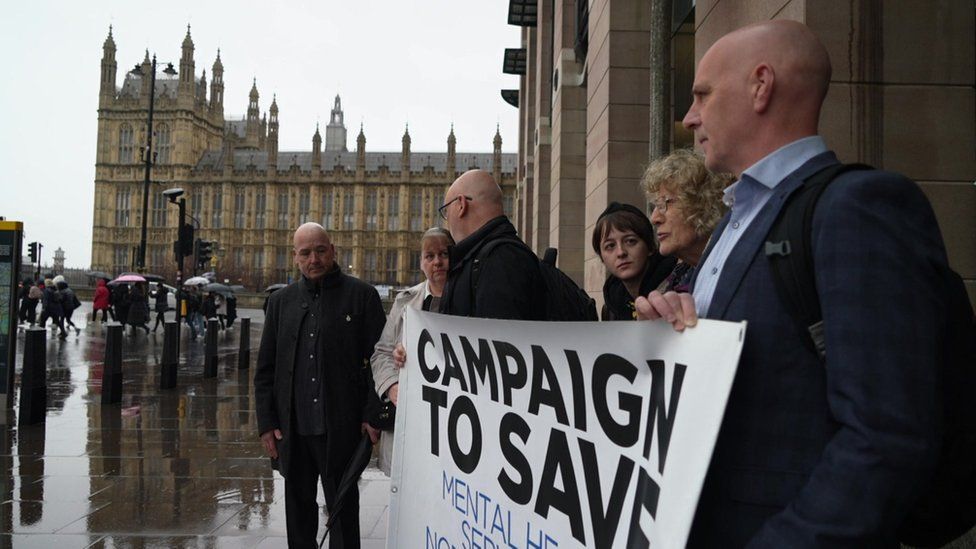Trust failed to heed safety warnings, campaigners say
Published4 minutes agoShareclose panelShare pageCopy linkAbout sharingBy Sophie HutchinsonBBC NewsA mental health trust linked to thousands of unexpected patient deaths repeatedly failed to act on coroners’ safety warnings, campaigners say.BBC News has been given exclusive access to new evidence from coroners’ reports gathered by a campaign group.It wants a criminal investigation into why so many patients died at Norfolk and Suffolk NHS Foundation Trust – and has sent police the evidence.The trust said it was “working really hard” to learn from past deaths.Bereaved families told the health minister the trust should be shut down.Campaigners, including patients and bereaved families, claim it is failing to make vital safety improvements despite promising to do so. Last summer, a report found more than 8,000 mental-health patients had died unexpectedly in Norfolk and Suffolk between 2019 and 2022. This is defined as the death of a patient who has not been identified as critically ill or whose death is not expected by the clinical team.The new evidence, based on 38 coroners’ prevention of future death (PFD) reports since 2013, suggests there were repeated warnings more patients could die unless safety issues were addressed, including:dangerously poor record-keeping and communicationfamily concerns being ignored unsafe levels of staffing at the trustAnd campaigners say the trust’s failure to improve safety has led to more deaths.’Real change’They met Minister for Mental Health Maria Caulfield and MPs, at Westminster, on Tuesday, and demanded an independent public inquiry over “the ongoing deaths crisis” at the trust.Natalie McLellan, whose daughter Rebecca died in November, says the 24-year-old was abandoned by her mental health team after being diagnosed with bipolar disorder. She wants “real change”.”You can’t keep ignoring mental health in this country – there is a death crisis and these beautiful young people, and old, are losing their lives because of inadequacies,” Natalie said. “We need to address it now.”Seven years ago, following the death of Henry Curtis-Williams, 21, a coroner warned about poor record-keeping.Image source, Curtis familyHenry was sectioned and taken to hospital in 2016, after being found by police on a bridge, but was discharged the next day by a junior member of staff and a few days later killed himself.In the PFD report about Henry’s death, assistant coroner Dr Séan Cummings said there was a “culture of not recording contemporaneous notes” and communication between staff was “very informal” with “no record kept of important messages relayed”.Henry’s mother, Pippa, says her only child’s death has had a catastrophic impact on her and she remains devastated by his treatment.”I replay it in my mind often,” she said. “It really was a catalogue of one failure after another, particularly in the clinical note keeping and the premature discharge. “I feel on a daily basis nothing other than anger and bitter resentment towards the trust.”If you don’t keep accurate clinical notes in chronological order, then how can a new nurse that comes on shift have any idea what’s happened previously to the patient?”Since Henry’s death, the evidence from campaigners suggests nine other other mental health patients have died with some of the same safety issues raised in the PFD reports. Five of those deaths were linked to unsafe record-keeping, campaigners say.One of the reports also refers to the falsifying of records.The trust said its quality of care rating had, earlier this year, been upgraded from “inadequate” to “requires improvement”.And over the past six months, it had improved its collection, processing and use of mortality data.’Recovery-support programme’An official said: “We offer our sincere condolences to all families and carers of people who have lost loved ones. “We can assure all families and carers that we are working really hard to learn from these incidents and do our very best to ensure they are minimised in future. “A review of prevention of future deaths is already under way to ensure improvements in practice have been made and learning is embedded across our clinical services.” NHS England said it would ensure the improvements needed to deliver safe and high quality care to patients were achieved and targets in the wider improvement plan reached.”We are working with Norfolk and Suffolk Foundation Trust and have already helped them to achieve an improved CQC [Care Quality Commission] rating,” an official said.”The trust will remain in NHS England’s national recovery support programme to receive the highest level of scrutiny and support.”More on this story’Spin doctors’ paid £800k by struggling NHS trustPublished7 November 2023Bereaved mum wants unsafe mental health care endedPublished12 December 2023Public inquiry call over mental health death dataPublished10 July 2023NHS trust lost track of patient deaths, review findsPublished28 June 2023
Read more →


